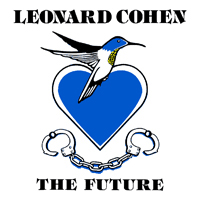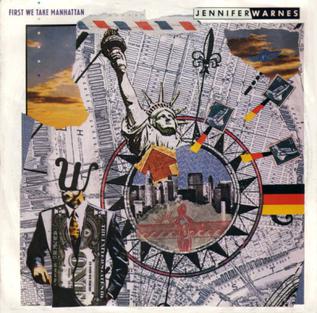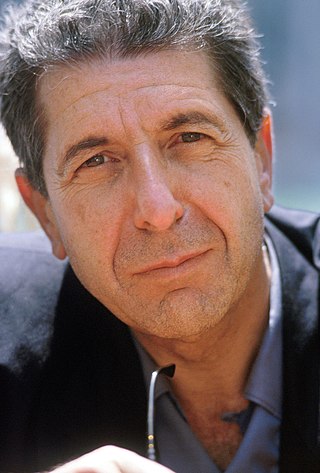Related Research Articles

Kathryn Dawn Lang, known by her stage name k.d. lang, is a Canadian pop and country singer-songwriter and occasional actress. Lang has won Juno Awards and Grammy Awards for her musical performances. Hits include the songs "Constant Craving" and "Miss Chatelaine".

The Future is the ninth studio album by the Canadian singer-songwriter Leonard Cohen, released in 1992. Almost an hour in length, it was Cohen's longest album up to that date. Both the fall of the Berlin Wall and the 1992 Los Angeles riots took place while Cohen was writing and recording the album, which expressed his sense of the world's turbulence. The album was recorded with a large cast of musicians and engineers in several different studios; the credits list almost 30 female singers. The album built on the success of Cohen's previous album, I'm Your Man, and garnered overwhelmingly positive reviews. The Future made the Top 40 in the UK album charts, went double platinum in Canada, and sold a quarter of a million copies in the U.S., which had previously been unenthusiastic about Cohen's albums.

I'm Your Man is the eighth studio album by Canadian singer Leonard Cohen, released on February 2, 1988 by Columbia Records. The album marked Cohen's further move to a more modern sound, with many songs having a synthesizer-oriented production. It soon became the most successful studio album which Cohen had released in the US, and it reached number one in several European countries, transforming Cohen into a best-selling artist.

New Skin for the Old Ceremony, released in 1974, is the fourth studio album by Leonard Cohen. On this album, he begins to evolve away from the rawer sound of his earlier albums, with violas, mandolins, banjos, guitars, percussion and other instruments giving the album a more orchestrated sound. The album is silver in the UK, but never entered the Billboard Top 200 in the US.

"Hallelujah" is a song written by Canadian singer Leonard Cohen, originally released on his album Various Positions (1984). Achieving little initial success, the song found greater popular acclaim through a new version recorded by John Cale in 1991. Cale's version inspired a 1994 recording by Jeff Buckley that in 2004 was ranked number 259 on Rolling Stone's "the 500 Greatest Songs of All Time".

Stranger Music is a 1993 book by Leonard Cohen. It compiles many of his published poems, as well as the lyrics to his songs.

Famous Blue Raincoat: The Songs of Leonard Cohen is the sixth studio album recorded by the American singer Jennifer Warnes. It debuted on the Billboard 200 on February 14, 1987, and peaked at No. 72 in the US Billboard chart, No.33 in the UK albums chart, and No.8 in Canada. Originally released by Cypress Records, it was reissued by Private Music after Cypress went out of business. It is the only Jennifer Warnes album to make the UK albums chart.
"Famous Blue Raincoat" is a song by Leonard Cohen. It is the sixth track on his third album, Songs of Love and Hate, released in 1971. The song is written in the form of a letter. The lyric tells the story of a love triangle among the speaker, a woman named Jane, and the male addressee, who is identified only briefly as "my brother, my killer."

"Shapes of Things" is a song by the English rock group the Yardbirds. With its Eastern-sounding, feedback-laden guitar solo and environmentalist, antiwar lyrics, several music writers have identified it as the first popular psychedelic rock song. It is built on musical elements contributed by several group members in three different recording studios in the US, and was the first Yardbirds composition to become a chart hit; when released as a single on 25 February 1966, the song reached number three in the UK and number eleven in the US.
"Bird on the Wire" is a song written by Canadian musician Leonard Cohen, which became one of his signature songs. It was recorded 26 September 1968 in Nashville and included on his 1969 album Songs from a Room. A May 1968 recording produced by David Crosby, titled "Like a Bird", was added to the 2007 remastered CD. Judy Collins was the first to release the song on her 1968 album Who Knows Where the Time Goes. Joe Cocker also covered the song on his second studio album the following year and his version reached #78 in Canada.

Anjani Thomas is an American singer-songwriter and pianist, best known for her work with singer-songwriter Leonard Cohen, as well as Carl Anderson, Frank Gambale, and Stanley Clarke. She became a solo artist in 2000.

"First We Take Manhattan" is a song written by Canadian singer-songwriter Leonard Cohen. It was originally recorded by American singer Jennifer Warnes on her 1986 Cohen tribute album Famous Blue Raincoat, which consisted entirely of songs written or co-written by Cohen.
"Avalanche" is a song by Leonard Cohen. It appears on his third album, Songs of Love and Hate, released in 1971.

Matthew David Morris is an American singer, songwriter, record producer, and former Episcopal priest. He has released solo projects on Tennman/Interscope Records, but is best known for his work as a songwriter and producer for a variety of artists, including Joy Williams, Justin Timberlake, Christina Aguilera, Kelly Clarkson, Reba McEntire, Mary J. Blige, Sarah McLachlan, Kimbra, and Cher.

Leonard Cohen was a Canadian singer-songwriter and poet who was active in music from 1967 until his death in 2016. Cohen released 14 studio albums and eight live albums during the course of a recording career lasting almost 50 years, throughout which he remained an active poet. His entire catalogue is available on Columbia Records. His 1967 debut Songs of Leonard Cohen earned an RIAA gold record; he followed up with three more highly acclaimed albums: Songs from a Room (1969), Songs of Love and Hate (1971) and New Skin for the Old Ceremony (1974), before allowing Phil Spector to produce Death of a Ladies' Man for Warner Bros. Records in 1977. Cohen returned to Columbia in 1979 for Recent Songs, but the label declined to release his next album, Various Positions (1984) in the US, leaving it to American shops to import it from CBS Canada. In 1988, Columbia got behind Cohen again and gave full support to I'm Your Man, which brought his career to new heights, and Cohen followed it with 1992's The Future.

Leonard Norman Cohen was a Canadian singer-songwriter, poet, and novelist. Themes commonly explored throughout his work include faith and mortality, isolation and depression, betrayal and redemption, social and political conflict, and sexual and romantic love, desire, regret, and loss. He was inducted into the Canadian Music Hall of Fame, the Canadian Songwriters Hall of Fame, and the Rock and Roll Hall of Fame. He was invested as a Companion of the Order of Canada, the nation's highest civilian honour. In 2011, he received one of the Prince of Asturias Awards for literature and the ninth Glenn Gould Prize.

Intimacy Remixed is the remix album to Intimacy, the third album by indie rock band Bloc Party. It was released on 11 May 2009 in the United Kingdom through Wichita Recordings, the band's primary label, in limited edition CD and triple LP formats to coincide with Bloc Party's worldwide touring schedule. The record entered the UK Album Chart at number 79. In the United States, it achieved a peak of number 15 on the Billboard Dance/Electronic Albums chart.

Jeffrey Adam Gutt is an American singer and songwriter who has been the lead vocalist for Stone Temple Pilots since November 2017. He is also the former lead vocalist for the nu metal band Dry Cell.
Jeff Fisher is a SOCAN award-winning American composer, producer, arranger and musician born in Montreal, Quebec. He is probably best known for composing the soundtrack for the original run of the YTV-CINAR horror anthology series, Are You Afraid of the Dark?, and has composed Proteus 2 scores for the other CINAR-produced programs including The Little Lulu Show, The Baskervilles, and Animal Crackers. Fisher worked on two of Leonard Cohen's most successful albums, I'm Your Man, arranging and playing all the music on the hit song "First We Take Manhattan", and its follow up, The Future. He has toured extensively with international recording artists.
Tower of Song: A Memorial Tribute to Leonard Cohen was a concert, which was held at the Bell Centre in Montreal, Quebec on November 6, 2017 as a tribute to singer-songwriter Leonard Cohen marking the first anniversary of his death. The concert, which featured musicians performing Cohen songs, was subsequently broadcast by the Canadian Broadcasting Corporation as a radio and television special, airing on CBC Music on November 7, 2017 and on CBC Television on January 3, 2018.
References
- 1 2 Cohen, L. (2008). The Lyrics of Leonard Cohen: Enhanced Edition. Omnibus Press. p. 65. ISBN 978-1-78323-883-5 . Retrieved January 26, 2023.
- 1 2 Shea, Brandon (2014). "Leonard Cohen as a Guide to Life". In Holt, Jason (ed.). Leonard Cohen and Philosophy: Various Positions. Popular Culture and Philosophy. Open Court. p. 5. ISBN 978-0-8126-9882-4.
- 1 2 3 4 Beviglia, Jim (September 27, 2021). "Behind The Song: "Democracy" by Leonard Cohen". American Songwriter. Retrieved January 18, 2024.
- 1 2 "The Future". AllMusic. Retrieved January 15, 2024.
- 1 2 "Democracy by Leonard Cohen, Jeff Fisher". AllMusic. Retrieved January 15, 2024.
- 1 2 3 Grattan, L. (2016). Populism's Power: Radical Grassroots Democracy in America. Oxford University Press. ISBN 978-0-19-027762-8 . Retrieved January 26, 2023.
- ↑ Vosloo, Robert R. (May 25, 2016). "Democracy is coming to the RSA': On democracy, theology, and futural historicity" (PDF). Verbum et Ecclesia. ISSN 2074-7705 . Retrieved January 15, 2024.
- 1 2 Spear, Jeffrey L. (2019). "The Fractured World of Leonard Cohen". In Mitsi, Efterpi; Despotopoulou, Anna; Dimakopoulou, Stamatina; Aretoulakis, Emmanouil (eds.). Ruins in the Literary and Cultural Imagination. Palgrave Macmillan. p. 193. ISBN 978-3-030-26904-3.